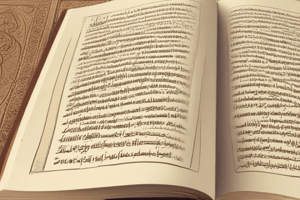Podcast
Questions and Answers
What is the implication of the accusation that most Muslim scholarship has been based on forgery?
What is the implication of the accusation that most Muslim scholarship has been based on forgery?
- That all scholars of the first four centuries of hadith collection collaborated in a mutual conspiracy. (correct)
- That there was no forgery involved in Muslim scholarship.
- That only scholars from a particular school of thought were involved in the forgery.
- That only a few scholars were involved in the forgery.
What is a characteristic of the scholars of the first four centuries of hadith collection?
What is a characteristic of the scholars of the first four centuries of hadith collection?
- They were all from the same school of thought.
- They were all from the same region.
- They belonged to varied and competing schools of thought. (correct)
- They were all known for their dishonesty.
What is said about the character of the scholars of the first four centuries of hadith collection?
What is said about the character of the scholars of the first four centuries of hadith collection?
- They were known for their dishonesty and corruption.
- They were renowned for their piety and integrity of character. (correct)
- Their character is unknown.
- They were a mix of honest and dishonest individuals.
What is the tone of the passage regarding the accusation of forgery in Muslim scholarship?
What is the tone of the passage regarding the accusation of forgery in Muslim scholarship?
What is the author's primary concern regarding the accusation of forgery in Muslim scholarship?
What is the author's primary concern regarding the accusation of forgery in Muslim scholarship?
What is a common criticism leveled against hadith?
What is a common criticism leveled against hadith?
According to Azami, what is the error in the criticism of hadith being forged to support legal rulings?
According to Azami, what is the error in the criticism of hadith being forged to support legal rulings?
What is the significance of the time period mentioned, "the second and third century after Hijrah"?
What is the significance of the time period mentioned, "the second and third century after Hijrah"?
What is the implication of Azami's explanation regarding the faulty comparison of legal and hadith literature?
What is the implication of Azami's explanation regarding the faulty comparison of legal and hadith literature?
What is the primary focus of the content provided?
What is the primary focus of the content provided?
What is the name of the book by Muhammad M. Azami that examines Schacht's work on the origins of Islamic jurisprudence?
What is the name of the book by Muhammad M. Azami that examines Schacht's work on the origins of Islamic jurisprudence?
Which of the following institutions is associated with Azami's book 'On Schacht's Origins of Muhammadan Jurisprudence'?
Which of the following institutions is associated with Azami's book 'On Schacht's Origins of Muhammadan Jurisprudence'?
What year was Azami's book 'Studies in Early Hadith Literature' published?
What year was Azami's book 'Studies in Early Hadith Literature' published?
What is the primary focus of Azami's book 'Studies in Early Hadith Literature'?
What is the primary focus of Azami's book 'Studies in Early Hadith Literature'?
Which of the following best describes the relationship between Azami's two books mentioned in the excerpt?
Which of the following best describes the relationship between Azami's two books mentioned in the excerpt?
Flashcards are hidden until you start studying
Study Notes
Accusations of Forgery in Muslim Scholarship
- Accusations of widespread forgery in early Muslim scholarship imply an unrealistic collaboration among diverse scholars, conflicting in theological and political beliefs.
- Scholars from the first four centuries of hadith collection operated independently across various geographical locations, making a mutual conspiracy improbable.
- Historical scholars were characterized by their piety and strong moral integrity, further undermining claims of collusion.
Criticism of Hadith Authenticity
- Critiques often target the period of the second and third centuries after Hijrah, alleging that hadiths were fabricated to support legal rulings by jurists.
- This perspective fails to recognize the distinct nature of legal literature compared to hadith literature, as emphasized by Azami's analysis.
Distinction Between Legal and Hadith Literature
- There exists a fundamental difference between the fields of legal and hadith literature, meaning that conclusions drawn in one context may not apply to the other.
- Faulty comparisons can lead to misconceptions about the integrity and development of hadith studies versus legal scholarship.
Studying That Suits You
Use AI to generate personalized quizzes and flashcards to suit your learning preferences.




